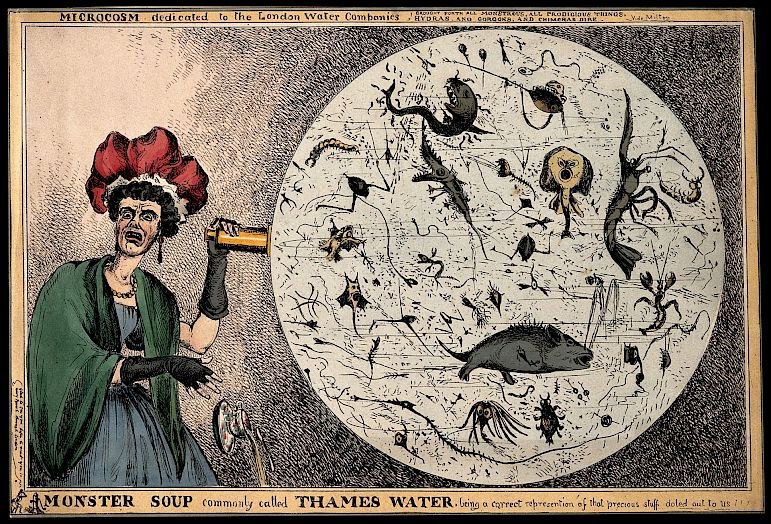OP-ED—Toynbee Coronavirus Series: At war with the virus, no battles to win, only a future to lose by Glenda Sluga and Madeleine Herren
Toynbee Coronavirus Series—A Global Historical View of the Pandemic

By Glenda Sluga (European University Institute/University of Sydney) and Madeleine Herren (University of Basel)
When on March 27 Pope Francis streamed his Urbi et Orbi blessing from the steps of St. Peter's Basilica in Rome, the Vatican announced the “extraordinary prayer for an end of the coronavirus pandemic” as a powerful historic ritual addressing the whole world. Meanwhile, the UN Secretary General evokes the theme of global solidarity daily, but the UN Security Council has been unable to include the COVID-19 pandemic on its work agenda. The venerable World Health Organization (WHO) is now the fall guy for a failing United States government (itself seemingly at war with many of its constituent states), which is threatening its funding. Rather than restore the WHO’s global authority and funding, some spokespersons in the West are calling for an exclusive G20 health body, as if viruses stop at wealthy borders and the fate of the poorer parts of the world do not matter.
From the increasingly favoured legitimation of emergency laws as an appropriate reaction for saving the nation and protecting Hungarian citizens (and only Hungarian citizens), to the Chinese remembrance of victims as national martyrs, an old-fashioned, even xenophobic, patriotic nationalism is underscoring the connections between our world and that of a century ago, despite the differences that technological and cultural changes and fast communication technologies have made.

These days, it is all too apparent that in a majority of cases, the global dimensions of the crises we face are being tackled within national parameters, often with the emphasis on patriotism, national behaviours, and national interests. Analysts anticipate the global spread of an ideological virus—namely a new wave of the strongman-backed authoritarian nationalisms typified by Hungary’s Orban regime. In general, national governments are adopting wartime postures and policies, along with military infrastructures, in their ‘fight’ against the pandemic. From the increasingly favoured legitimation of emergency laws as an appropriate reaction for saving the nation and protecting Hungarian citizens (and only Hungarian citizens), to the Chinese remembrance of victims as national martyrs, an old-fashioned, even xenophobic, patriotic nationalism is underscoring the connections between our world and that of a century ago, despite the differences that technological and cultural changes and fast communication technologies have made. At the most, a global perspective occurs in the obsessive televised and world wide web-based comparisons of national COVID-19 “curves” (of countries deemed relevant), the log-graphs of which now dominate our view and reflect our experience of everyday life.
As international historians we observe these developments with evidence-based trepidation. As humans, we have certainly been here before. In 1919, as the disastrous World War I finally ended, economic and political dislocation alongside the savage spread of the “Spanish flu” led to the extension of wartime authoritarian powers far beyond the armistice. Even as the parliaments of liberal democracies continued to meet, their respective state manoeuvres often blurred the lines between democracies and emergency regimes. A century later, nation-states are transgressing those same borders in the interests of national security but with only the metaphors of war (not an actual war) as a source of legitimation. Despite the unlimited availability of Zoom-life, some governments (vedi Australia) feel that the practice of parliament is worth it. As many commentators have noted, in the circumstances, there is much to lose, including civil rights, democratic institutions, let alone institutionalized forms of humanitarianism and solidarity. A century ago, during the Spanish flu pandemic, even as newly invented cinemas were shuttered, newly independent states, at the least, kept their parliaments open.

History only fuels our accruing sense of unease with contemporary turn inward, to national solutions to global problems, swaddled in the language and policies of war. By contrast, each of the 20th century’s major threshold crises, the horizon of democratic, inclusive, and equitable state and international, even global, expectations were closely aligned. If we take public health as our example, during both world wars, it was in anticipation of the post-war that intergovernmental health organisations were given conceptual form. Dreamers dreamed big, invoking universal norms that established the intersecting interests of state and global-based public health obligations, including the goal of improving the health of the world’s population through the sharing of expertise and resources. Today’s WHO is one manifestation of the principles of public health and equity that for much of the 20th century undergirded the welfare state and obligated national governments to accept responsibility for protecting the health of their populations in toto. The weakness and vulnerability of today’s WHO reflects the relative weakness of the welfare ideal, no more so than in the same state that helped found so many of these intergovernmental instruments, the United States of America.
During both the First and Second World Wars, the global scale of the social, economic, and political challenges faced by nations were met with a determination to think about how to reinvent the world, on a scale that incorporated and transcended the governance and democratising potential of national states. Even when we imagine just how different our own moment is, history really is useful. We need only recall that the principle of access to information beyond fake news and censorship crucial to definitions of equality and democratic access to health services, let alone employment, has echoes too in the past. The promise of trans-national exchange of information has been the core principle of almost every intergovernmental organization for more than a century.
In 1919, at least among liberal western states, the postwar ideal of the national-state was as closely identified with social policies that protected the rights of workers and held up the prospects of cooperation with employers and governments. This same ideal was enshrined in the “social justice” imperatives of the International Labour Organization (ILO), which also owes its existence in major part to the United States, and still exists today. In 2020, as the world faces the fallout of a systemic crisis of capitalism, the ILO’s view of a ‘postwar’ future rarely makes headlines, but the organization has elaborated a vision of the need for a new deal, once again through its tripartite system of cooperation: states, worker confederations, and employers, world-wide.
Yet the lessons of history tell us that the world has known and applied more than one version of a global community. What we think of as globalization, with its trade- and market-obsessed parameters (some sustained by especially designed international institutions and laws), is only the most recent and reduced version of a global future we need to imagine.
Even as national patriotism has encouraged competition for scarce medical resources (even within nation-states as well as between them), there has been a strange relative silence about the extent to which, in the past, at moments of global crisis, the world has gone in search of global answers. While the Financial Times recently invoked the spirit of 1945 that led to the establishment of the UN and finance-focused “Bretton Woods” system, we have heard less about aspirations for postwar global social justice, for sharing resources, scientific and material. Yet the lessons of history tell us that the world has known and applied more than one version of a global community. What we think of as globalization, with its trade- and market-obsessed parameters (some sustained by especially designed international institutions and laws), is only the most recent and reduced version of a global future we need to imagine.

Paris, 1918.
https://www.biusante.parisdescartes.fr/histoire/images/index.php?refphot=04565
There are more versions of a global and globalized world than either the liberal economist Keynes or neo-liberal Hayek dreamed of. Where national polities no longer have an interest in sharing expertise or obligation, we find ourselves however in a more challenging situation that demands more radical solutions. Among these is the call for a “global commons”, a new vision that might address, for example, the more uncomfortable implications of the environmental pollution created by the digital world, or that could transform global health by bringing the voices of experts into political arena.
If we are stuck with analogies of war, then these same histories warn us not only that we cannot wait for the pandemic to be “over”, but also that during each major war extensive political and social movements supported intertwined national and multilateral responses to the global dimensions of health and economic challenges. But where invocations of war, of battles against the virus enemy, might offer comfort precisely because they posit a moment of victory—a V-Day—the intersecting global challenges of pandemic, capitalism and planetary destruction we now face allow us no such complacency. We have arrived at a moment of existential global crisis without precedent, and without history’s promise of narrative closure.